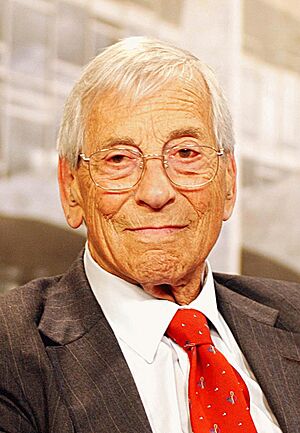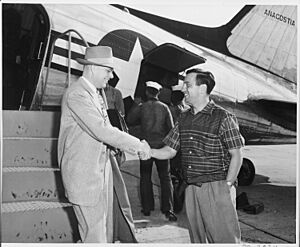Richard Neustadt facts for kids
Quick facts for kids
Richard Neustadt
|
|
|---|---|

Neustadt in 2003
|
|
| Born |
Richard Elliott Neustadt
June 26, 1919 Philadelphia, Pennsylvania, U.S.
|
| Died | October 31, 2003 (aged 84) London, United Kingdom
|
| Education | |
| Occupation | Political scientist, adviser, and professor |
| Spouse(s) |
|
| Children | 2 |
Richard Elliott Neustadt (born June 26, 1919 – died October 31, 2003) was an American expert on politics. He studied the U.S. presidency very closely. He also worked as an adviser for several presidents.
His famous book, Presidential Power, is known as one of the most important books ever written about how political leaders make decisions. Another one of his books, Thinking In Time: The Uses Of History For Decision Makers, won a special award called the Grawemeyer Award.
Contents
Early Life and Education
Richard Neustadt was born in Philadelphia, Pennsylvania. His father, Richard Mitchells Neustadt, was a social worker who worked for good causes.
Richard went to the University of California, Berkeley and earned a degree in History in 1939. Later, he studied at Harvard University, where he received his master's degree in 1941 and his Ph.D. in 1951.
During World War II, he joined the US Navy in 1942. He worked as a supply officer in different places, including the Aleutian Islands. After the Navy, he worked for the government in the Bureau of the Budget, which is now called the Office of Management and Budget.
Career in Politics and Teaching
From 1950 to 1953, Neustadt was a special assistant in the White House for President Harry S. Truman. This meant he helped the President with important tasks.
After his time at the White House, he became a professor. He taught about how government works at Cornell University and then at Columbia University. At Columbia, he received an award for his teaching in 1961.
Understanding Presidential Power
While teaching at Columbia, Neustadt wrote his most famous book, Presidential Power, in 1960. In this book, he looked closely at how decisions are made by the President.
He explained that the President actually doesn't have as much power as people might think. To make big changes, the President needs the approval of Congress. Neustadt said that a President has to be good at convincing others, have a strong reputation among other politicians, and be popular with the public to get things done.
Advising Presidents
Richard Neustadt's book came out just before John F. Kennedy was elected President. Kennedy was very interested in Neustadt's ideas. Neustadt soon became an important adviser. He even wrote a 20-page memo for Kennedy, suggesting what the new President should and shouldn't try to do.
Neustadt officially advised Presidents Harry S. Truman, John F. Kennedy, and Lyndon B. Johnson. He also gave unofficial advice to President Bill Clinton.
He taught at the Harvard Kennedy School for over twenty years. He was a very popular professor. He also became the first director of the Harvard Institute of Politics (IOP). This institute was created to help young people get involved in politics and public service.
Neustadt was recognized for his work by being elected to important groups like the American Academy of Arts and Sciences. He also received the Grawemeyer Award in 1988 for his book Thinking In Time, which he wrote with Ernest R. May.
Personal Life
Richard Neustadt's first wife, Bertha Cummings "Bert" Neustadt, passed away in 1984. In 1987, he married Shirley Williams, a British politician. She also taught at the Kennedy School of Government.
Richard Neustadt passed away in London in 2003 due to complications from a fall. He was survived by his wife, Shirley Williams, his daughter Elizabeth, and a granddaughter. His son, Richard, had passed away earlier in 1995.
Books by Richard Neustadt
- 1960: Presidential Power and the Modern Presidents: The Politics of Leadership
- 1970: Alliance Politics
- 1986: Thinking In Time : The Uses Of History For Decision Makers, with Ernest R. May
- 1999: Report to JFK: The Skybolt Crisis in Perspective
- 2000: Preparing to be President: The Memos of Richard E. Neustadt, with Charles O. Jones
 | Selma Burke |
 | Pauline Powell Burns |
 | Frederick J. Brown |
 | Robert Blackburn |


